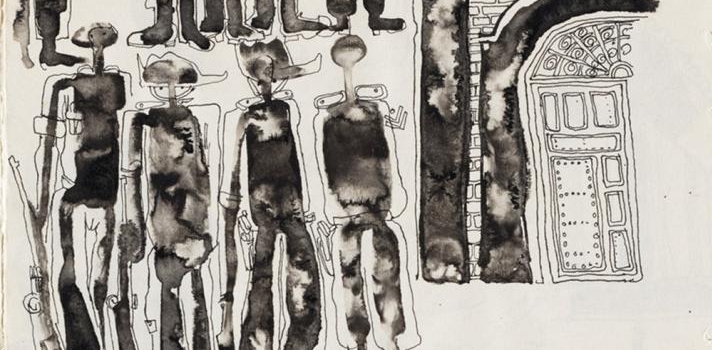Al-Bashir’s Trial
A Sudanese Lesson to the ICC
August 20, 2021

Image excerpt from Ibrahim El-Salahi’s Prison Notebook via THE MUSEUM OF MODERN ART
In August 2021, the Sudanese government decided to hand over former Sudanese President Omar al-Bashir, along with other officials of his regime, to the International Criminal Court (ICC). Nearly 12 years earlier, in May 2009, the ICC issued its first arrest warrant for al-Bashir, followed by a second warrant a year later in July 2010 that confirmed the charges directed against him. Al-Bashir was a dictator who ruled Sudan for almost three decades until his ousting in April 2019 following mass protests.
Upon being forced to leave office by the Sudanese military in 2019, al-Bashir was arrested and jailed in Cooper prison in Khartoum. The prison, called Cooper or Kober, was built in 1903 during the British colonial period in Sudan, and has witnessed different phases of the Sudanese history until today. It was where the British detained their nationalist opponents, and from where the post-colonial governments controlled the country with an iron fist.
The experiences of the prisoners in Cooper prison have been captured in various remarkable artistic and film projects. One of the most prominent works are of artist Ibrahim al-Salahi, who produced his Prison Notebook illustrating the “anguish and pain” he experienced while imprisoned in Cooper for six months in 1975. His artwork significantly reflects the traumatic brutalities that various ruling authorities in Sudan but also in the broader region commit across generations and through the decades. The Prison Notebook includes al-Salahi’s Arabic writings before their English translation, and his drawings remind us that if we want to make sense of the brutalities of the administers of the prisons in Sudan, we should begin from what the Sudanese prisoners do and how they live.
In 2019, Al-Salahi warned against the hijacking of the “people’s revolt” by yet another repressive military regime in Sudan. He stated that “young men and women went with their chests open to die not to let the army take over. But the army has its ways of keeping on… This, to me, is a betrayal of the people’s revolt.” Al-Bashir faces several charges that include crimes against humanity, war crimes, and genocide. It is time for the international community to make the trial of al-Bashir and his allies a real matter, but with the understanding that this phase of presenting al-Bashir for accountability and trial results directly from Sudanese people’s suffering, efforts, and sacrifices.
Al-Bashir played an essential role in the war in Darfur and who led many Sudanese to leave their country seeking for asylum and refuge, and he should not be punished ‘far’ from his own victims and survivors. If the ICC will judge al-Bashir in the present based on his atrocities in the ‘past,’ it must also connect the proceeding that will occur in the Hague, Netherlands, where the ICC is based, to Sudan, where the effects of al-Bashir’s crimes still haunt the Sudanese people souls and bodies today. Following al-Salahi’s statement, what al-Bashir did should not extracted be from the Sudanese contexts and struggles. The recent decision by the court in Koblenz, Germany to extend an “Arabic interpretation service” for the public during the trial of members of the Syrian regime of Bashar al-Assad is a significant example of how steps can and should be taken to center the victims and context in which crimes occurred, even when tried in external national courts. The ICC, as an international court, needs to ensure that measures are taken to include past and present experiences when presenting perpetrators of past and ongoing harms, such as those of al-Bashir.